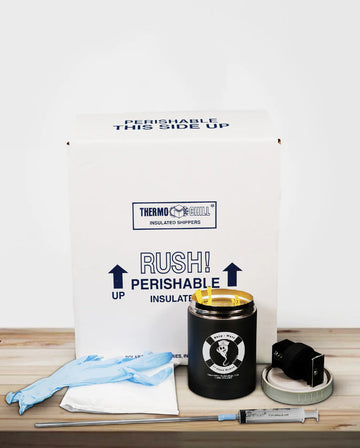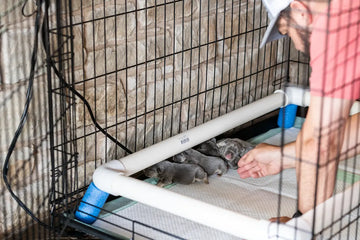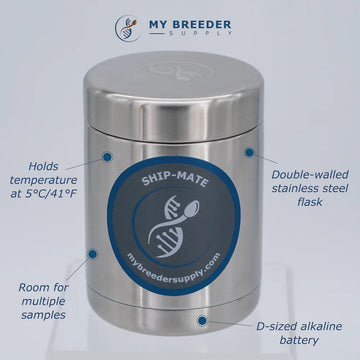Understanding Singleton Puppy Syndrome: Challenges and Care for Solo Puppies
by Phenyx Media on Sep 16, 2023

In the wonderful world of canine companions, variety is truly the spice of life. From differing breeds and personalities to unique life circumstances, our furry friends offer a delightful mix of experiences. One such unusual condition is known as the Singleton Puppy Syndrome. But what exactly is this syndrome? How does it impact the puppies and their caregivers? Let's take a deep dive into understanding this fascinating condition.
Introduction to Singleton Puppy Syndrome
In the canine birthing world, a single-pup litter is often met with surprise and intrigue. Typically, dogs birth multiple pups, creating a bustling and playful litter that grows together, learning and interacting in their unique puppy language. However, in some instances, a female dog, or a bitch, gives birth to just one puppy, making it a singleton.
What is Singleton Puppy Syndrome?
Singleton Puppy Syndrome isn't a disease or a disorder. Rather, it's a situation involving a unique set of circumstances that affect the solo puppy and its development. The syndrome essentially signifies the challenges and issues that may arise due to the absence of littermates. This situation can result in behavioral and physical anomalies that differentiate singleton puppies from those raised in a standard litter.
Causes of Singleton Puppy Syndrome
Singleton Puppy Syndrome doesn't have a single cause. It could result from numerous factors, often intertwined in complex ways. The bitch's age, health, breed, and overall reproductive health play a significant role. Sometimes, despite a healthy pregnancy, the dog may birth only one puppy. Additionally, certain dog breeds are more prone to producing singleton puppies due to their genetic disposition. Remember, it's a play of nature and genetics, not a fault or a flaw.
Challenges Associated with Singleton Puppies

Raising a singleton puppy can be a different ball game compared to raising a litter. The challenges are unique and multifaceted, covering developmental and health-related aspects.
Developmental Challenges
Littermates play a crucial role in a puppy's development. They engage in playful fights, establish hierarchies, and learn the do's and don'ts of canine behavior. A singleton puppy, unfortunately, misses out on this vital learning playground.
Physical Development
It may seem counterintuitive, but singleton puppies often face physical developmental issues. While they enjoy the sole access to their mother's milk and care, the lack of competition often results in slower development. They don't feel the need to 'fight' for resources, a natural instinct that typically promotes growth and development.
Behavioral Development
Behaviorally, singleton puppies are at a disadvantage too. They miss out on crucial social learning that occurs through interaction with littermates. This lack of early socialization can lead to behavioral issues, such as aggression, fear, or anxiety. The puppy equivalent of home-schooling might seem like a boon, but it has its drawbacks!
Health Challenges
Health-wise, singleton puppies are at a higher risk. They might have lower immunity and higher susceptibility to congenital abnormalities and obesity due to overfeeding. With only one puppy to focus on, pet parents might inadvertently overfeed, leading to early onset of obesity.
Care for Singleton Puppies
Despite these challenges, raising a singleton puppy is not all doom and gloom. With careful planning and consistent efforts, you can ensure your solo puppy blossoms into a healthy, happy adult dog.
Socialization Strategies
Proactive socialization is key. Arrange regular play dates with other dogs or puppies, introduce them to various environments and experiences, and consider enrolling them in puppy socialization classes. Essentially, you need to become the 'littermate' they never had, guiding them to understand the social intricacies of being a dog.
Training Techniques
A singleton puppy requires patience, consistency, and understanding. Regular training sessions using positive reinforcement can work wonders in curbing behavioral issues. Establish consistent rules and be patient, remembering they missed out on early 'puppy etiquette' lessons.
Health and Nutritional Care
Regular veterinary check-ups and balanced nutrition are essential for your singleton puppy's health. Be mindful of their diet and ensure they're not overfed. Engage them in age-appropriate exercise and activities to keep obesity at bay.
The Role of a Veterinary Professional

A professional vet plays a significant role in a singleton puppy's life. Regular health screenings, tailored nutrition advice, and customized care plans contribute significantly to the pup's well-being.
Conclusion
While singleton puppies may face unique challenges, with the right care and attention, they can lead healthy, fulfilling lives. Understanding these challenges is the first step in providing the best care for your solo puppy.
FAQs About Singleton Puppy Syndrome
What is a Singleton Puppy?
A singleton puppy is the only puppy born in a litter. This is a unique situation that brings about its own set of challenges and care requirements.
Does a Singleton Puppy have health issues?
Singleton puppies may be more susceptible to certain health issues, including obesity, lower immunity, and higher risk of congenital abnormalities.
Are Singleton Puppies more aggressive?
Singleton puppies can display behavioral issues due to a lack of early socialization. However, this isn't a rule and can be managed with the right training and socialization strategies.
How can I socialize my Singleton Puppy?
Socializing a singleton puppy involves exposing them to different environments and experiences, arranging play dates with other dogs, and considering puppy socialization classes.
What role does a vet play in a Singleton Puppy's care?
A vet plays a crucial role in monitoring the singleton puppy's health, advising on nutrition, and guiding towards a tailored care plan.




